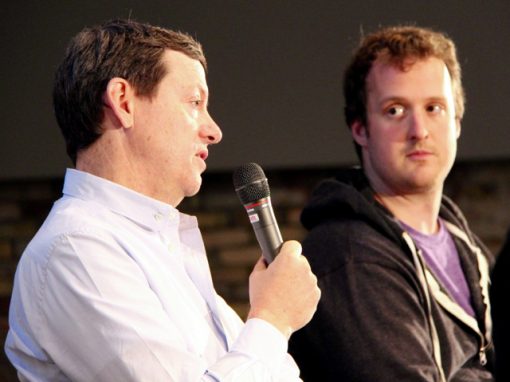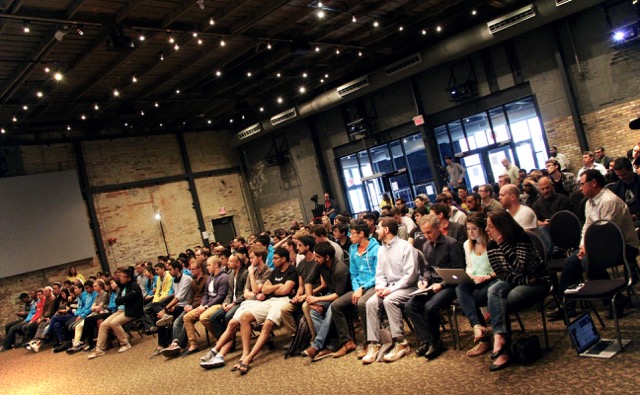Whenever they met in New York, they would go for long walks, often on the High Line in Manhattan.
When they’d get together in Waterloo, they’d drive out to the river for a stroll along its banks.
It’s the type of thing anyone does in the early stages of a relationship – and venture capitalists and entrepreneurs are no exception.
In this case, we’re talking about the courtship of Fred Wilson, co-founder of New York-based Union Square Ventures, and Ted Livingston, co-founder and CEO of Kik, the Waterloo-based mobile chat company. Wilson, a pre-eminent VC and blogger, is deeply invested in Kik.
Fred and Ted, as they were billed, appeared this week before a capacity crowd at Waterloo Region’s Tannery Event Centre, to take part in an hour-long chat with Mike Kirkup, Director of the University of Waterloo’s Velocity startup program. Livingston started Kik when he was a UW student living in the Velocity residence, and at age 23, donated a whopping $1 million to the program in 2011 to help fund other student-led startups.
Among many insights shared during the wide-ranging talk was that it takes time and effort to build an effective investor-investee relationship.

Fred Wilson addresses the crowd as Ted Livingston looks on.
(Communitech photo: Anthony Reinhart)
“It took Ted and I a while to figure out how to work with each other,” Wilson said. “It wasn’t until we collectively made the commitment to start spending quality time together that things started to click.”
That quality time was often spent walking, which is Livingston’s preferred vehicle for conversation.
“That was the beginning of us starting to understand each other,” Wilson said.
“It’s like any relationship, whether it’s a co-founder, boyfriend and girlfriend, husband and wife, co-worker. You just have to make the effort to understand where the other person is coming from, and it’s got to be mutual.
“Once we got that, it kind of worked out.”
Things have definitely worked out for Livingston, whose popular instant messaging platform has raised US$70.5 million in investment since 2010 and now boasts more than 200 million users worldwide, as well as for Wilson, whose investments have included Twitter, Etsy, Tumblr, Foursquare, Kickstarter and Zynga.
The two have also been generous in sharing their success; Wilson through his support of education and community development projects in New York, and Livingston through his donation of funds and mentorship to Velocity startups.
The two men’s humanistic approach extends to their business dealings.
When Kirkup pointed out that Canadian startups tend to exit early through acquisition rather than scale to a size where they can go public, Wilson acknowledged the tough slogging that entrepreneurs must go through to achieve that scale – and how difficult that work can be without the right type of support from investors.
“It’s a 10-year grind, and there aren’t that many people who can stick it out for that long when people come along and start dangling money in front of them,” he said. “So the only way you can incent entrepreneurs and their management teams to really play for the long haul is to provide some liquidity along the way.”
In New York, which has seen a similar problem of early exits, Wilson’s firm has tried to combat it by doing just that – freeing up cash to ease the burden on the founders it funds.
“Not tremendous amounts of liquidity,” Wilson said, “but enough liquidity so that they can buy a home and think about sending their kids to college and all that kind of stuff, to take off some of that financial pressure.”
At Kik, every employee is a shareholder, and when the company raised a US$38.3-million Series C round last November, all were permitted to sell up to five per cent of their vested shares – but Livingston and his two top executives didn’t stop there.
Since the straight-up five per cent stock sale wouldn’t necessarily recognize individual team members’ contributions to Kik in a proportional way, the executives “came up with an equation” to rectify any distortions, Livingston told the crowd.
Then, “to make it super fair . . . [we] actually gifted $20 million worth of shares back to the team . . . we smoothed that out,” he said, to an eruption of applause.
Wilson was also outspoken when Kirkup asked for his thoughts on the perceived lack of civic engagement among tech leaders, as companies such as Uber battle governments over regulation of their businesses; in Uber’s case, a ride-hailing app that competes directly with the highly regulated taxi industry.

The Tannery Event Centre was full during this week’s UW Velocity event with
Fred Wilson and Ted Livingston. (Communitech photo: Anthony Reinhart)
“Well, first of all, I think it’s tough to ask the entrepreneurs to [engage with regulatory issues], because the entrepreneurs are building companies, and they can’t spend all their time dealing with government and governmental officials,” Wilson said. “So I do think there’s a role for the venture community in being an advocate for our portfolio companies” in such discussions, he said.
At the same time, however, some “sharing economy” tech companies have been reluctant to acknowledge the negative impacts of their operations, Wilson said.
“There are people who live in New York in apartment buildings, next door to an apartment that’s getting rented out every night on Airbnb,” he said, “and they’ve got random people walking through their hallway every day who they don’t know, who are staying up late and making a lot of noise, and that’s not actually a good thing.”
Rather than turn a blind eye to these impacts, Wilson argued, the tech community “ought to admit that’s not a good thing, and we ought to try and have a conversation with people about how we can put the proper controls in place, so that services are used in ways that are helpful and are not used in ways that are harmful.
“I don’t like it when people in my business, or in the startup sector, are blindly like, ‘We’re disruptors, and screw those people; we’re making the world better and just get off my back.’ It’s not really true,” Wilson said.
“There’s always some harm that’s created when you build something new, and it does, I think, make sense to have a conversation about what the rules of the game should be, to make sure that things are safe and things are done properly.”
As for Waterloo Region, Wilson has made several visits since his first one in November of 2010, when he met with Livingston for the first time at a Founders and Funders event at Waterloo’s Accelerator Centre, amid a swirl of hype around the upstart messaging company. A few months later, Wilson’s firm led Kik’s Series A round, and he returned to Waterloo Region to meet with startups at the Communitech Hub shortly thereafter.
He said the Waterloo-Toronto corridor’s rich talent pool, in both technology and business, is more than enough to fuel its robust startup community, but that local investment capital, particularly at the angel and seed stage, is sorely lacking.
“That’s good for us, because we’re seeing a lot of opportunities come our way,” said Wilson, whose firm also has two investments in Toronto. “It’s obviously not great for the entrepreneurs, because they have to work harder; they have to go to New York, they have to go to San Francisco, or they’ve got to go to Boston to try to raise capital.”
Livingston pointed out that, without many big exits locally, early-stage investments by successful tech entrepreneurs have been hard to come by. Wilson agreed that entrepreneurs tend to make the best angel and seed investors, because “they get it, they’ve seen it, they know there’s value in doing that, and they do it relatively easily without putting you through crazy hoops.”
But other tech founders aren’t the only source of funding, he pointed out.
“The other place it could come from, and it has started to come from a lot in New York, is the broader business community,” Wilson said.
“There are certainly a lot of people in the Toronto-Waterloo corridor who invest in real estate projects; there are certainly a lot of people who work in financial markets, whether they’re managing mutual funds or hedge funds or whatever,” he continued. “These people have capital, but in New York they weren’t willing to invest in startups for a long, long time, until they started to see repeated wins, and then they said, ‘Well I’m going to jump in there and do that, too.’
“So I actually think there’s a lot of capital in the wealthy tier here in Toronto-Waterloo that could come in and provide some of that angel and seed capital,” Wilson said, “but it’s going to take a few successes to get them to do that.”
If any company in the region is poised for that kind of success, it’s Kik.
Anthony Reinhart is Communitech’s Director of Editorial Strategy and senior staff writer. View from the ‘Loo looks at the issues, people and events that shape Waterloo Region’s technology sector.

